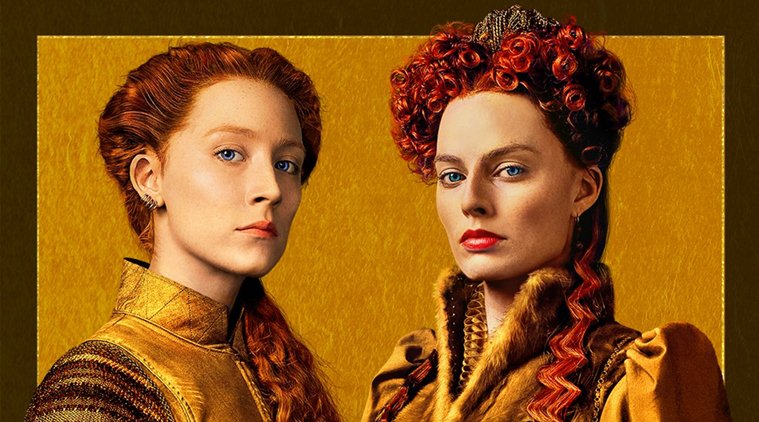
Mary Queen of Scots movie cast: Saoirse Ronan, Margot Robbie, Jack Lowden, James McArdle, Guy Pearce, Joe Alwyn
Mary Queen of Scots movie director: Josie Rourke
Mary Queen of Scots movie rating: 3.5 stars
The writer-producer of Ides of March, Beau Willimon knows a bit or two about the workings of power and politics. The writer-producer of House of Cards, he knows more than a lot when gender is in the mix. It all comes ambitiously, archingly together in Mary Queen of Scots, whose screenplay was drafted by Willimon from a novel on that royal.
At most times, this period film on two women working their way around the definitions and labels crafted for them, bound by and straining against them, and accepting gender fluidity, could belong to today. It also goes further than that. Mary Stuart and Elizabeth I are queens surrounded by resentful all-men courtiers. But are “the rules of men” (as Mary calls them) the only thing that holds them back? Director Rourke, who has a career in theatre, flirts with that question often, and both Ronan and Robbie understand and play with it to portray one of the most insightful love/hate, jealousy/rivalry, womanhood/motherhood relationship between two women on screen.
We know Mary’s (Ronan) fate right at the beginning, when she is led to the gallows to be beheaded. It is done on Elizabeth I’s (Robbie) orders. The film then travels back, 25 years, to 1561 when, as an 18-year-old widow, Mary lands on Scotland’s shores from France to claim her rights to its throne — and by birth, to that of England’s. She is Catholic, but Scotland has been turning Protestant under the tutelage of England. England’s Protestant queen is Elizabeth I. The religious schism, fuelled by blood-thirsty heads of church, is just one of the hurdles Mary has to cross — and Ronan does it with fierce determination. It is hard to believe the young actor is the same girl from Ladybird of a year ago, such is the conviction she brings to the role of a woman who believes it her divine right to rule. Towards that, Mary can be conniving, cunning, ruthless, but also kind.
Over in England, the insecure Elizabeth I, conscious of Mary’s greater right to the throne, is becoming even more apprehensive. The only person she trusts is the love of her life, Earl of Leicester Robert Dudley (Alwyn), but not enough to marry him and let him have some power over the throne. She holds back all pressure from the court, led by William Cecil (Pearce), to produce an heir, which would finally cement her hold over England’s throne.
Rourke and Willimon craft their tale of Mary and Elizabteth around this gender dynamics.
Mary: How far can a woman push to get what she wants? How does she accommodate a man’s ego in a power balance leaning towards her? Should she choose love and be called a harlot, or let the men decide what she can/can’t do? Finally: Play the pregnancy card, throw it at the ‘barren’ Elizabeth, and watch her misery?
Elizabeth: Can a woman be a woman without being a wife and a mother? Would a man in her shoes be asked the same questions, and is that what is required of her, to be the man the crowd needs? How soft is too soft, and is offering up your own love as a pawn in this game of thrones too hard? Finally: Calmly acknowledge Mary’s superiority for producing a child?
If Ronan is the obvious star of this duel, as the film intends, Robbie is deceptively good as her foil. As the woman who spends her life fitting roles, doing everything to keep the crown, till the crown becomes her. By the end, the woman who once welled up on seeing a stallion born and bunched up her gown to see how she would look pregnant, has been completely erased. What we have is Elizabeth as the portrait of a Queen.
Given the force of Ronan and Robbie’s performances, the film lets them down by falling to the temptation of painting them as victims.
Mostly courtiers in this drama, the men even otherwise make no impression — with the exception of Jack Lowden as Mary’s effete husband Henry Darnley and McArdle as Mary’s treacherous half-brother James. When Darnley demands that Mary cede to him as her husband, she silences him with one line that is easily this film’s crowning glory: “One minute (of impregnating her) does not make a man.”